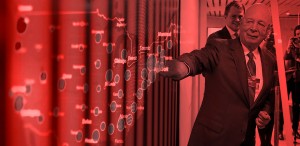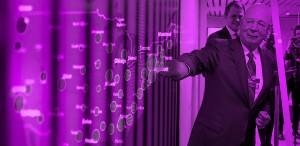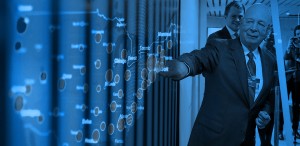(NOTE: This series originally appeared in The Daily Wire.)
If you understand nothing else about Klaus Schwab and his World Economic Forum, get this: they are godless.
That matters. From your answer to the question “Does God exist?” flows the whole of your worldview. If your government thinks you are a product of random chance and necessity, and that there is no God to judge in the next life their actions in this one, history demonstrates with chilling clarity how that plays out.
In Part 3 of this series, I said that Schwab’s literary references in his books suggested a shallow understanding of the humanities and none whatsoever of religion. There are, however, numerous philosophical references in which he reveals a more intimate knowledge: Friedrich Nietzsche, Antonio Gramsci, Steven Pinker, Yuval Noah Harari, and Peter Singer to name only a few. This is telling. All of them are atheists, and aggressively so. Schwab quotes them favorably, and that the WEF has taken a little from each is obvious:
From Nietzsche, the idea of the Superman who can face the harsh reality of a world without any ultimate transcendent hope.
Gramsci, an evil little Italian communist, contributed the ideas for the overthrow of the Christian and democratic West; ideas that inform the subversive tactics of the radical Left from Black Lives Matter to the sexualization of children. (I explain in this short video.)
Pinker, a cognitive psychologist at Harvard, sang the siren song of perpetual human progress in his books The Better Angels of Our Nature and Enlightenment Now, a tune irresistible to secular scientific elites.
Harari, a historian at Hebrew University in Jerusalem, has written a personal mission statement reading: “Care about suffering.” And yet, according to Ian Parker of The New Yorker, Harari nonetheless speaks of suffering with “nihilistic composure.” Adds Parker: “The subject of human suffering—even extreme suffering—doesn’t seem to agitate Harari in quite the way that industrial agriculture does.” Perhaps that’s because his original mission statement, “Embrace ambiguity,” leaves open the question of whose suffering he cares about.
And Singer.
Peter Singer, a bioethicist at Princeton University, is quite possibly the most influential philosopher of the second half of the twentieth century and beyond. In 1975 he published Animal Liberation, giving rise to the modern animal rights movement. (Once when dining with him in his hometown of Melbourne, Australia, I listened as he explained his animal rights philosophy. A vegetarian for obvious reasons, he ordered gnocchi. Wordlessly, I expressed my views on animals and their place within creation by ordering kangaroo.)
He is the most philosophically consistent atheist I have ever met, and I’ve known more than a few. In addition to debating the late atheist journalist Christopher Hitchens, Tuft’s cognitive scientist Daniel Dennett, and Skeptic Magazine editor Michael Shermer, I organized and chaired three of Oxford evolutionary biologist Richard Dawkins’s debates. But Singer is, by far, the most dangerous of the lot, and that is because he is willing to follow his atheism to its dark conclusions.
Journalist Kevin Toolis writes of him: “[W]hat is legitimate for Singer is just plain murder for other people.”
It is Singer’s view that man is an animal like any other and that he deserves no special status among the various species. That is, he argues, a residual of Christian thought. Worse, he has argued that parents should get twenty-eight days with a newborn child to determine if they want to keep it or euthanize it. This is where atheism, pushed to its logical outcome, takes you. And it’s where the WEF would like to take the rest of us.
This bring us to Dennis Meadows, Emeritus Professor of Systems Management at the University of New Hampshire. Meadows is an original member of the Club of Rome and one of the co-authors of Limits to Growth, a mega-bestseller that informs the WEF’s agenda. Meadows thinks we must reduce the global population by, oh, a mere 6-7 billion people. But no worries, he wants to do it “peacefully.”
These are the people from whom Schwab and the WEF take their cues. Pinker, Harari, Singer, and Meadows are WEF “agenda contributors.” That’s a little more than what appears at the bottom of this article: The views expressed in this piece are those of the author … Read their books. Watch them in smug conversation. They simply cannot resist telling you want they think and what they want to do. These are your would-be overlords.
Combine these murderous ideas with politicians who have the power to implement them—more than fifty government leaders attended this year’s WEF annual meeting—and you have a toxic combination.
Take, for example, Ursula von der Leyen. Perhaps you saw her recently in the news. She is the unelected President of the European Commission who threatened Italy with unspecified sanctions should they elect a prime minister at odds with the EU’s vision for the continent. (I’m delighted to say the Italians defied von der Leyen.) She is also a WEF agenda contributor and is front and center in this WEF leadership photo.
* * * * *
At bottom, the WEF has no actual power. They possess no armies, they hold no seat at the UN, and they are stateless. What they have is influence. Schwab is Mr. Networker Guy. He has managed to gather world leaders of disparate cultures, languages, of democratic and non-democratic countries, some who are enemies, all of whom have participated on a voluntary basis, and he’s given them an organizing vision. But it’s not Dale Carnegie How to Win Friends and Influence People techniques that have enabled him to do it. It’s the product he is selling and that they all want:
Absolute power.
It is a fact of history. We are always just a step from totalitarianism. Those politicians who would readily embrace it and the thugs who would readily enforce it are always there. It just needs someone to speak it into being, to offer a roadmap to get there. That’s what the WEF offers, and it offers it all under the cover of environmental and humanitarian virtue.
Do you really think Xi or Saudi Prince Mohammed bin Salman, both WEF participants, really care about “a sustainable future”? The WEF deals in the laundering of reputations, those of current or aspiring tyrants in particular.
In my considerable experience engaging men who posture as some of the world’s smartest, I’ve discovered that when it comes to seductive but unworkable utopian ideas, intellectuals are not unlike football coaches with talented but troublesome players: they are sure that they will be able to succeed where the last guy could not. As a consequence, Marxism and fascism live on like Antonio Brown’s career.
With the threat of a climate apocalypse serving as Plato’s Noble Lie, Marxist-style government power grabs are taking place all over the Western world. But Marxism could never survive on its own because Marxist economics don’t work. So, it must always adopt a fascist element, loosening government restrictions on private property and a market economy; not totally, but as the Chinese have done it: “socialism with Chinese characteristics.” The addition of ESG—Environmental, Social, and Governance—is that fascist element. A kind of coercive corporate social credit system, once compliance is fully in place, it will bring all industry to government heel.
The path to totalitarianism, you see, is quite clear.
I have visited the sites of past claimants to the utopian throne. They are not, as you might suppose, great works of architecture or museums housing their treasures. They are places with names like Auschwitz, Mauthausen, Buchenwald, Babyn Yar, Lefortovo, and Lubyanka. They are the homes I have visited in Cuba, China, Russia, Vietnam, and half a dozen more where dissenters must hide from the regime. Because the most consistent feature of earthly utopias is their gulags and their gallows.
But there is, I think, a path to a “sustainable future” for freedom.
In his book Civilization: The West and the Rest, Harvard historian Niall Ferguson quotes a scholar from the Chinese Academy of Sciences:
We were asked to look into what accounted for the … pre-eminence of the West over all the world … At first, we thought it was because you had more powerful guns than we had. Then we thought it was because you had the best political system. Next we focused on your economic system. But in the past twenty years, we have realized that the heart of your culture is your religion: Christianity. That is why the West has been so powerful. The Christian moral foundation of social and cultural life was what made possible the emergence of capitalism and then the successful transition to democratic politics. We don’t have any doubt about this.
For centuries, the Christian faith served as the West’s bulwark against moral and political evils. But with the decline of Christian belief has come a corresponding rise in perversions of every kind. Rather than a Christian culture, we’ve become Christian-ish. Thus, concepts with a Christian foundation—love, freedom, tolerance, diversity, stewardship of the environment, care for the poor, etc.—are easily highjacked and harnessed to a destructive end. If the West is to survive in any recognizable sense, it must be more than Christian-ish.
As T.S. Eliot observed, “If Christianity goes, the whole culture goes.”
WAIT! Do you appreciate the content of this website? We are a nonprofit. That means that our work is made possible and our staff is paid by your contributions. We ask you to consider supporting this important work in an ongoing basis or, if you prefer, perhaps you will drop a few buck in our “tip jar.” All contributions are tax-deductible.






